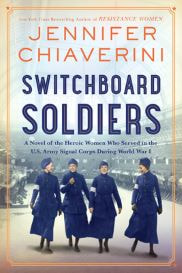|
In June 1917, General John Pershing arrived in France to establish American forces in Europe. He immediately found himself unable to communicate with troops in the field. Pershing needed operators who could swiftly and accurately connect multiple calls, speak fluent French and English, remain steady under fire, and be utterly discreet, since the calls often conveyed classified information. At the time, nearly all well-trained American telephone operators were women--but women were not permitted to enlist, or even to vote in most states. Nevertheless, the U.S. Army Signal Corps promptly began recruiting them. More than 7,600 women responded, including Grace Banker of New Jersey, a switchboard instructor with AT&T and an alumna of Barnard College; Marie Miossec, a Frenchwoman and aspiring opera singer; and Valerie DeSmedt, a twenty-year-old Pacific Telephone operator from Los Angeles, determined to strike a blow for her native Belgium. They were among the first women sworn into the U.S. Army under the Articles of War. The male soldiers they had replaced had needed one minute to connect each call. The switchboard soldiers could do it in ten seconds. The risk of death was real--the women worked as bombs fell around them--as was the threat of a deadly new disease: the Spanish Flu. Not all of the telephone operators would survive. The women of the U.S. Army Signal Corps served with honor and played an essential role in achieving the Allied victory. Their story has never been the focus of a novel...until now. Read a review by Ann Reeves:
Comments are closed.
|
AuthorsEPLD staff. Archives
July 2024
Categories |
||||||



 RSS Feed
RSS Feed